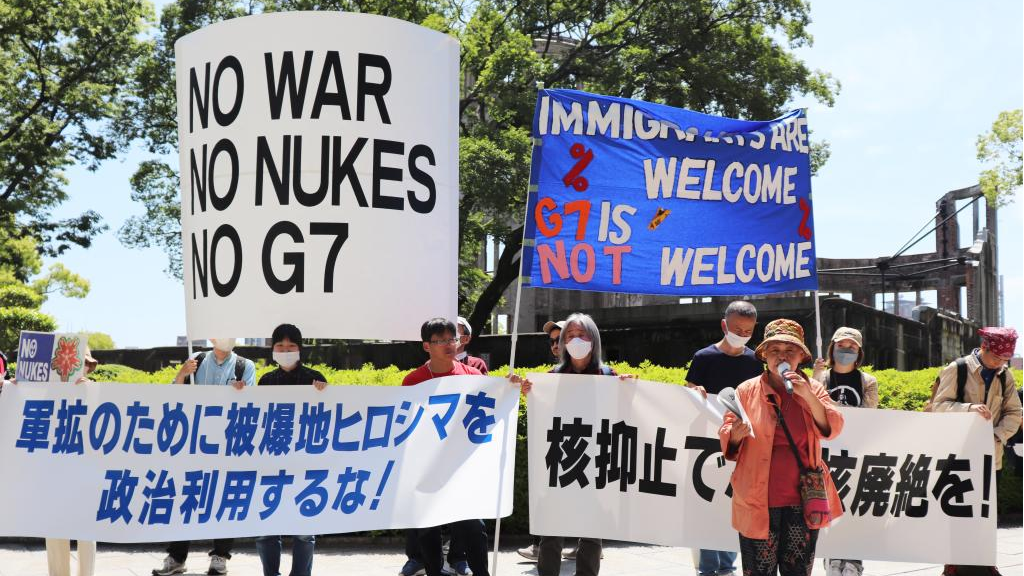
Editor's note: CGTN's First Voice provides instant commentary on breaking stories. The column clarifies emerging issues and better defines the news agenda, offering a Chinese perspective on the latest global events. This First Voice article is written by CGTN Special Commentator Jonathan Arnott, a former member of the European Parliament. The article reflects the author's opinions and not necessarily the views of CGTN.
Let's be honest. Europe is never going to be a global superpower. In many ways, there's no such thing as "Europe" on the world stage – any more than the word "Asia" has a specific political meaning. Europe, like every continent, is a mass of competing interests. When French President Emmanuel Macron suggests that Europe should become a superpower and resist the pressure to become "America's followers," he doesn't mean Europe the continent. He means the European Union, the political construct.
But the European Union isn't going to be a superpower either. In all the ways that count towards becoming a superpower (and I'll return to that later, because the whole notion of global superpowers is somewhat outdated), the European Union lacks what is needed. Economically, the 27 member nations represent a dwindling share of global GDP. Militarily, plans for a "European army" are in an embryonic state.
The notion of 27 nations, speaking 24 different languages, having single armed forces, is not something that could happen for a generation – if at all. Nor do they have enough in common on foreign policy to use any hypothetical military in an agreed-upon way. Even to make the attempt, as Macron suggests, would destroy all the European Union's claims to be about peace and unity. I believe his proposal is not genuine. It is designed for domestic consumption, words used to seek popularity amongst the French people rather than a serious policy agenda.
When Macron speaks of a European "superpower" to counter the United States, it may be hyperbole. But with the G7 meeting taking place in Japan from May 19 to 21, it's worth asking what the word "superpower" even means in the modern era. Historically, it evokes imagery of military might, economic domination, and aggressive foreign policy. It speaks of a global binary, epitomized by the United States and Soviet Union during the Cold War, with the arms race, the proxy wars, and the ideological conflict.
No nation has the same global footprint as the United States and the Soviet Union did. The world is built on a swirl of competing alliances, with official and unofficial affiliations, building coalitions based upon the situation. NATO is one such alliance; the G7 is another. Can the European Union claim to be a candidate for becoming a global superpower? Possibly. But if the world has ten superpowers, it really has none at all.

People holding banners protest against the Group of Seven (G7) summit at the site of the atomic bombing near the Peace Memorial Park in Hiroshima, Japan, May 14, 2023. /Xinhua
People holding banners protest against the Group of Seven (G7) summit at the site of the atomic bombing near the Peace Memorial Park in Hiroshima, Japan, May 14, 2023. /Xinhua
It is clear that this year's G7 summit will be a mass of competing interests. In some ways, it feels as though it is a summit without a common theme. Transactional, perhaps, but that is the direction of travel of so many global alliances. Japanese Prime Minister Fumio Kishida chose Hiroshima, the site of the first nuclear weapon used in war, as the location for the meeting. The symbolism is clear, but his views on such issues will not be supported by the United States.
Forget, for a moment, the G7's approach to the Russia-Ukraine conflict. It is known that the G7 will condemn Russia's actions, and indeed South Africa, which has declined to criticize Russia and has not been invited as an observer. Moreover, geographically tiny nation of the Comoros (which holds the rotating presidency of the African Union) is invited, and Ukraine will join in a way or another. There will be nothing new on Russia.
What is new is how the G7, and indeed how the world, will respond to massive technical leaps forward. Discussions on issues such as artificial intelligence (AI) will provide additional complexity as a fast-changing situation will not result in instant agreement. The impact will not be confined to the G7, or to China, or to the United States.
The famous mathematician John von Neumann once argued that a "singularity" will ultimately be reached in society, whereby technological progress becomes so fast that it irrevocably changes the nature of civilization. That is abstract, a theory developed on a chalkboard, rather than in real life.
I believe that even if the nature of civilization does not change, the interaction between nations certainly will. The days of global superpowers are gone. Nations both big and small will have a role to play with the AI-driven explosion in technology. If no one nation can ever dominate in global terms, superpowers as a political concept will be consigned to the dustbin of history. Nations will have influence, soft power, but nothing more.
The irony of it all is that a summit of the world's largest economies, G7, is likely to show that the dominance of the world's largest economies will inevitably come to an end.
(If you want to contribute and have specific expertise, please contact us at opinions@cgtn.com. Follow @thouse_opinions on Twitter to discover the latest commentaries in the CGTN Opinion Section.)